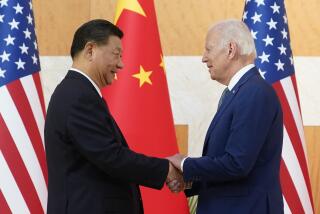A Not So Stealthy Meeting
- Share via
President Clinton had another one of those stealth encounters with a prominent person the other day, this time just “dropping in,” as the White House delicately put it, on a chat Vice President Al Gore was having with the Dalai Lama, the exiled spiritual leader of Tibet’s Buddhists. A stealth meeting is one the White House hopes won’t show up too prominently on the political radarscope. In this case, as in a 1994 meeting with the Dalai Lama, Clinton wanted to keep things as invisible as possible lest China, which claims sovereignty over Tibet, take offense. No one should have been surprised when things didn’t work out as hoped.
China let fly, accusing the United States of supporting independence for Tibet and pronouncing the meeting “gross interference in China’s internal affairs.” Such actions, said the Chinese Foreign Ministry, “hurt the feelings of the Chinese people and undermine bilateral relations.” Similar sentiments were expressed when Washington allowed President Lee Teng-hui of Taiwan to privately visit the United States. As with Tibet, Beijing insists that Taiwan is part of China.
Tibet has long been in China’s sphere of influence, though for most of the first half of this century it enjoyed nominal independence. When China’s Communist regime occupied Tibet in 1950 it began a sweeping program of cultural repression that took many lives and sent millions into exile. U.S. policy, which never recognized China’s occupation, is to support talks between China and the Dalai Lama to settle their considerable differences. Contrary to Beijing’s claims, the Dalai Lama no longer seeks Tibetan independence but, realistically, only a measure of autonomy.
Politics is often heavy with symbolism, and the symbol of the Dalai Lama as embodying the Tibetans’ refusal to bow to Chinese rule makes Beijing nervous. But the United States has its own interests and principles to uphold, and that rightfully includes support for human rights and a freer and better life for Tibetans. The President’s meeting schedule is not something that needs Beijing’s clearance or requires apology. The Dalai Lama deserves a more cordial and open welcome at the White House the next time he comes to plead his people’s case.
More to Read
Get the L.A. Times Politics newsletter
Deeply reported insights into legislation, politics and policy from Sacramento, Washington and beyond. In your inbox twice per week.
You may occasionally receive promotional content from the Los Angeles Times.










